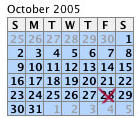31.10.05
29.10.05
The DAY after...
Well, it's the day after the night before - Adam will be recovering from his amazing victory.
Click here for a video of his triumphal speech (you'll need to save the file from the link - MAC: hold Control and click on link, then select SAVE LINKED FILE AS - ignore the APPEND message. PC: Right-click and SAVE LINKED FILE AS - needs Quicktime).
Click here for a video of his triumphal speech (you'll need to save the file from the link - MAC: hold Control and click on link, then select SAVE LINKED FILE AS - ignore the APPEND message. PC: Right-click and SAVE LINKED FILE AS - needs Quicktime).
18.10.05
Gaelle's recommendations
 1- Mutants: On the Form, Varieties and Errors of the Human Body
1- Mutants: On the Form, Varieties and Errors of the Human BodyArmand Marie Leroi
464 pages
Winner of the Guardian First Book Award 2004, Mutants is disturbing, fascinating and enlightening; in short, a remarkable book.
"This book is a well-written account of mutants and mutation, in which the author draws not only on his considerable scientific knowledge, but also illustrates his points very interestingly using vignettes from the history of the study of mutants. He deals with conjoined twins, the Elephant Man, pituitary abnormalities, the castrati etc... in a very readable but precise and concise manner."
Should satisfy my curiosity for "Freaks"...
 2- Hitchcock
2- Hitchcock Francois Truffaut
367 pages
The classic study of the great director and his films, comprising a series of dialogues between Hitchcock and Truffaut, is fully updated with material on Hitchcock's last years and his final four films as well as his more "classic" ones. A compelling read.
Fascinating for Hitchcock fans as well as anyone with an interest in films.
He is the Master after all...
15.10.05
Adam's Recommendations
Well it's non-fiction next month and these are my two recommendations:
1. We Wish to Inform you that Tomorrow we will be Killed with our Families - Philip Gourevitch.
This was the winner of the Guardian First Book award in the late 90s and is a journalistic account of the Rwandan Genocide. The genocide is one of the most shocking atrocities in recent history but compared to other genocides such as the Holocaust little is known about it. Gourevitch examines and explains the genocide through harrowing individual stories - both perpetrators and survivors and in fact the film Hotel Rwanda was based on one of the chapters in this book. I'll admit this is not going to be a cheerful read but it is also seems shameful that so many of us know so little about such a shocking event.
2. Rodinsky's Room - Rachel Lichenstein and Iain Sinclair
A fascinating book. David Rodinsky, caretaker of an old synagogue in Princelet Street near Brick Lane disappeared in the 1960s. Although the synagogue fell into dilapidation his room was left undisturbed for 20 years until Rachel Lichenstein, a Jewish artist happened upon it. The room was full of writings, annotated books, maps, gramophone records and clothes. Lichenstein, whose grandparents had fled from Poland in the 1930s started to try and piece together the shadowy figure that was David Rodinsky, a journey that takes her from the east end of London, to Poland and to Israel. She discovers that his world was that of Eastern Jewry, cabbalistic speculation, an obsession with language as code and terrible loss. This is a book about both the experience of Eastern European Jewry in the east end of London and Lichenstein's own search for her roots and Jewish identity. Weaved into this, in alternative chapters, the London based author Iain Sinclair meditates both on Lichenstein's quest to discover the "lost" David Rodinsky but also Rodinsky's Whitechapel and its immigrant past and present.
Adam R
1. We Wish to Inform you that Tomorrow we will be Killed with our Families - Philip Gourevitch.
This was the winner of the Guardian First Book award in the late 90s and is a journalistic account of the Rwandan Genocide. The genocide is one of the most shocking atrocities in recent history but compared to other genocides such as the Holocaust little is known about it. Gourevitch examines and explains the genocide through harrowing individual stories - both perpetrators and survivors and in fact the film Hotel Rwanda was based on one of the chapters in this book. I'll admit this is not going to be a cheerful read but it is also seems shameful that so many of us know so little about such a shocking event.
2. Rodinsky's Room - Rachel Lichenstein and Iain Sinclair
A fascinating book. David Rodinsky, caretaker of an old synagogue in Princelet Street near Brick Lane disappeared in the 1960s. Although the synagogue fell into dilapidation his room was left undisturbed for 20 years until Rachel Lichenstein, a Jewish artist happened upon it. The room was full of writings, annotated books, maps, gramophone records and clothes. Lichenstein, whose grandparents had fled from Poland in the 1930s started to try and piece together the shadowy figure that was David Rodinsky, a journey that takes her from the east end of London, to Poland and to Israel. She discovers that his world was that of Eastern Jewry, cabbalistic speculation, an obsession with language as code and terrible loss. This is a book about both the experience of Eastern European Jewry in the east end of London and Lichenstein's own search for her roots and Jewish identity. Weaved into this, in alternative chapters, the London based author Iain Sinclair meditates both on Lichenstein's quest to discover the "lost" David Rodinsky but also Rodinsky's Whitechapel and its immigrant past and present.
Adam R
11.10.05
New meeting!
Subscribe to:
Posts (Atom)
